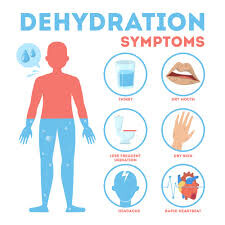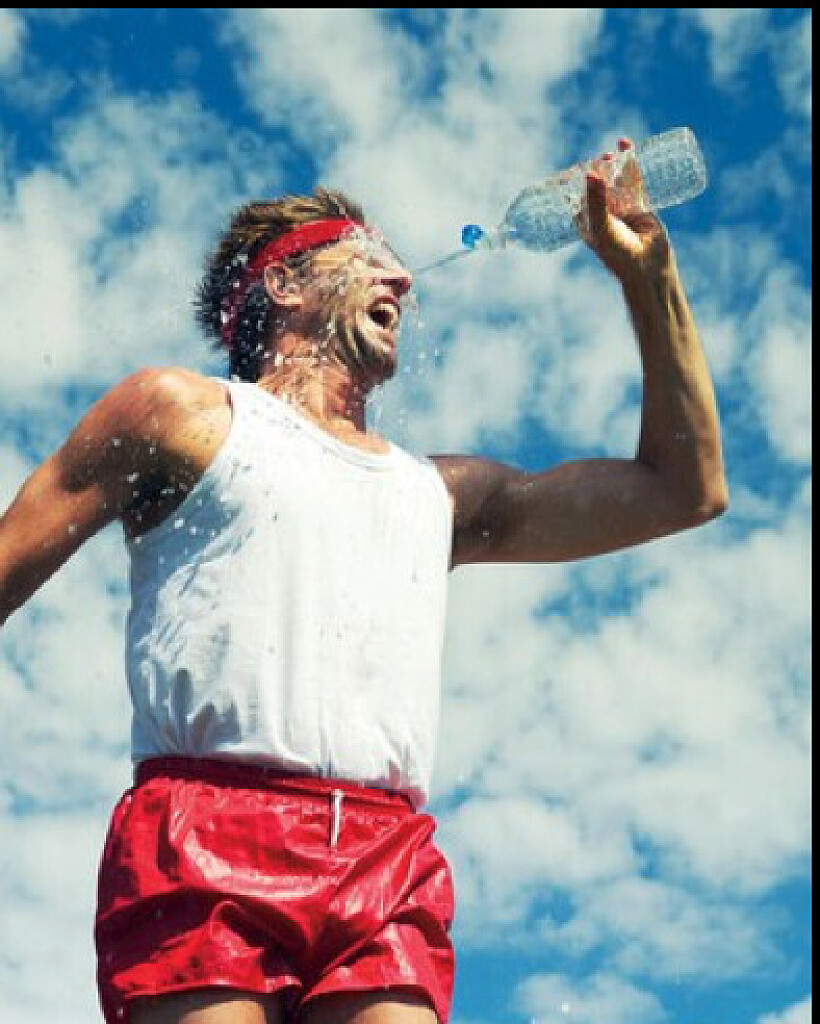Running News Daily
Running News Daily is edited by Bob Anderson. Send your news items to bob@mybestruns.com Advertising opportunities available. Train the Kenyan Way at KATA Kenya and Portugal owned and operated by Bob Anderson. Be sure to catch our movie A Long Run the movie KATA Running Camps and KATA Potato Farms - 31 now open in Kenya! https://kata.ke/
Index to Daily Posts · Sign Up For Updates · Run The World Feed
DEHYDRATION: IS IT ALL IN YOUR HEAD?
As you slog through those final dog-day runs of late summer, you’re no doubt making sure to replace all the fluids you sweat out—just as you never forget to floss and always send thank-you notes after dinner parties. In case you ever slack off, though, consider the following odd—and oddly reassuring—study.
Scientists at Loughborough University’s National Centre for Sport and Exercise Medicine in Britain, led by Lewis James, put a group of volunteers through a series of gruelling 15-minute cycling time trials in a heat chamber set to 34 C and 50 per cent humidity. Before each time trial, they did enough light exercise to sweat out two per cent of their starting body weight. Then the researchers snaked a feeding tube down their nose or throat and reinfused some of the fluids—or not.
The subjects thought they were testing the effects of different sports drinks. In reality, the scientists infused just enough water directly into their stomachs to set their dehydration level at 1.6 per cent. Then they lied to the subjects and told them either that they were two per cent dehydrated, or that they were fully rehydrated. The only difference between trials was what the subjects believed about their hydration. The result: their performance decreased by six per cent when they thought they were dehydrated, and they reported higher levels of thirst. Conversely, they reported more stomach fullness and bloating after the fictitious rehydration.

Such trick studies aren’t entirely new. James and his colleagues have published previous studies with a higher level of dehydration—three per cent—and, in that case, performance suffered equally, regardless of what the subjects believed about their hydration status. And back in 2015, Brock University’s Stephen Cheung used intravenous drips to manipulate hydration levels; in Cheung’s study, even three per cent dehydration had no apparent effect on cycling performance.
It’s not just dehydration that’s, at least in part, “in your head.” One study found that you’ll be less alert and more fatigued if you’re given fake sleep-tracker data that incorrectly suggests you had a bad night of sleep. A heating pad in the small of your back that makes you feel warm will make you run slower, even if the amount of heat it provides is too small to actually change your body temperature. A swig of sports drink will boost your performance, even if you spit it out rather than swallow it.
The wrong message to take from all this is that hydration—and heat and sleep and so on—doesn’t matter. The battle over hydration has been raging for almost two decades. It started with South African researcher Tim Noakes pointing out flaws in the existing dehydration research, most notably that the vast majority of studies didn’t distinguish between thirst and dehydration—and didn’t blind subjects to their condition. Those kinds of studies, as James’s new study makes clear, do indeed make dehydration seem worse than it really is.
Noakes wrote a book in 2012 called Waterlogged that pushed this argument to extremes, suggesting most dehydration research was a conspiracy funded by sports drink companies. True dehydration, he suggested, would be marked by the signs observed in a company of soldiers who got lost in the Texas desert in 1877: “an uncontrollable desire for water; inability to detect the presence of fluid or food in the mouth; inability to masticate food; uncontrollable desire to ingest any fluid, even blood or urine.” Others joined the fray; CrossFit launched a public campaign accusing Gatorade and the American College of Sports Medicine of causing numerous deaths by promoting overdrinking. Hydration became yet another culture war.
Of course, hydration isn’t the only topic where runners have drawn lines in the sand. Barefoot running, low-carb diets … heck, even nasal breathing—these are all topics where people don’t just believe they’re right, they believe that those who disagree with them must be doing it wrong. One of the most interesting and controversial scientific debates I’ve written about is whether our limits are dictated by the brain or the body. It seems clear to me that both play a role, but some people insist it has to be one or the other. “It’s like Freud saying it’s all sex,” the endurance writer Matt Fitzgerald once told me. “A lot is sex, but not everything!”
So where does that leave us on hydration? Noakes’s mantra is that you should drink when you’re thirsty and not worry about anything else. As a general guiding principle, I think that’s a good place to start. The fear that you need to be constantly drinking ahead of thirst—that by the time you notice you’re thirsty it’s already too late—is based on those outdated studies that conflate thirst and dehydration. And letting yourself get temporarily thirsty, like during a relaxed one-hour run, is no big deal, as long as you’ll have an opportunity to drink when you finish. In fact, there’s even evidence that sometimes allowing yourself to get thirsty during a run could help you adjust more rapidly to hot weather.
But thirst is just a rough guide. It only works if you’re paying attention to it, and if you’re able to respond when you notice it. One reason it makes sense to drink ahead of thirst in a marathon is that, if you get thirsty between fluid stations, it may be a long time before you get another chance to drink. And even if James found that 1.6 per cent dehydration doesn’t matter, his previous work suggested that 3.0 per cent dehydration does matter. There’s a middle ground here, one that acknowledges the physiological reality of dehydration but allows a reasonable margin for error. So, by all means, keep minding your hydration, and keep flossing and writing bread-and-butter notes—but if it slips your mind now and then, don’t stress about it.
Alex Hutchinson is a Toronto journalist specializing in the science of running and other endurance sports, and the author of Endure: Mind, Body, and the Curiously Elastic Limits of Human Performance (now in paperback).
Login to leave a comment




